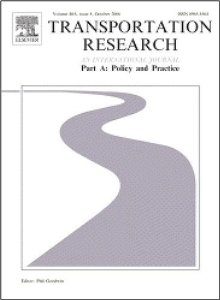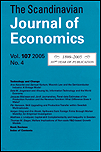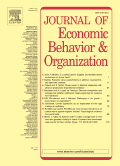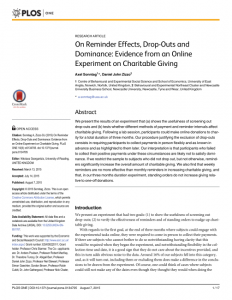Publications
My Publications
Filter by type:

Focality is intuitive - Experimental evidence on the effects of time pressure in coordination games
We experimentally examine the effects of varying time pressure in a coordination game with a label salient focal equilibrium. We consider both a pure coordination game (payoff symmetry) and a battle of the sexes game with conflict of interest (payoff asymmetry). In symmetric games there are no effects of time pressure, since the label-salient outcome is highly focal regardless of how much time subjects have to decide. In asymmetric games less time results in greater focality of the the label-salient action, and it becomes significantly more likely that any coordination is on the focal outcome.
Rauchen bei Jugendlichen - Verhaltensökonomisch basierte Maßnahmenevaluation
This publication is available in German only.
Mit der Anpassung des gesetzlichen Mindestalters für den Erwerb, Konsum und Besitz von Tabakwaren auf 18 Jahre reagiert die Gesetzgebung auf eine bedenkliche „Spitzenposition“: In
keinem Land Europas rauchen mehr Jugendliche unter 15 Jahren. Die Gesetzesänderung soll von einem umfassenden, von der ARGE Suchtvorbeugung empfohlen Paket an Präventions-
und Entwöhnungsmaßnahmen begleitet werden: Jugendliche sollen über angepasste Hotlines und eine App Unterstützung beim Rauchstopp erhalten, digitale, interaktive und
niederschwellige Kommunikation sollen die Norm des Nichtrauchens unter Jugendlichen stärken, zudem empfiehlt die ARGE ein bundesweit einheitliches Vorgehen bei
Gesetzesverstößen.
Die vorliegende Arbeit analysiert die vorgeschlagenen Maßnahmen aus verhaltensökonomischer Perspektive, unterstützt die Forderung nach einem möglichst einheitlichen Sanktionsmodell und schlägt Ansätze zur Implementierung und systematischen Evaluierung eingeführter Maßnahmen vor. Die Analyse des Rauchverhaltens auf Basis internationaler Studien in einem Framework, das Verhalten auf die wesentlichen Treiber Bereitschaft und Bewusstsein zurückführt, zeigt dabei: Weniger das Wissen über die grundlegende Schädlichkeit des Rauchens ist das Problem (Bewusstsein), als die über verschiedene verhaltenspsychologische Biases beeinflusste Bereitschaft, dieses Wissen in die Tat umzusetzen: RaucherInnen werten zukünftigen Nutzen von Nichtrauchen tendenziell stärker ab als NichtraucherInnen, haben einen ausgeprägteren Glauben, von negativen Ereignissen nicht betroffen zu sein und stehen unter großem Einfluss von Gewohnheiten und sozialen Kontextfaktoren. Die vorgeschlagenen Maßnahmen zielen hingegen weitgehend auf Kommunikation und Bewusstseinsbildung ab, können dadurch an Wirksamkeit einbüßen. Sie haben jedoch Potenzial, durch eine verhaltensökonomische Optimierung in der Ausgestaltung auch psychologische oder soziale Anreize der Bereitschaft zu adressieren. Dies gilt insbesondere für die Rauchfrei-App, die gleichsam hohen Adaptionsspielraum und ein ideales Test-Umfeld für die Evaluierung mittels Randomized Controlled Trials (RCT) bietet.
Bezüglich des Umgangs mit Verstößen ist die Forderung nach einem gemeinsamen Vorgehen der Länder aus verhaltensökonomischer Perspektive zu unterstützen. Der konkrete Vorschlag knüpft dabei an die bestehende Gesetzgebung der Länder sowie den Vorschlag eines – an die Entwicklungsstufe der Pubertät – angepassten Stufenmodells an. Ein Informations- bzw. Beratungsgespräch kann insbesondere dann Wirkung entfalten, wenn es in unmittelbarem zeitlichen Kontext des Vergehens steht und Komplementarität zu den Präventionsmaßnahmen bietet. Folgevergehen werden bislang vor allem durch die Auferlegung gemeinnütziger Arbeit und Geldbußen geahndet. Hier ist im Falle der Arbeitsleistung ratsam, eine stärkere, inhaltliche Verbindung zum Vergehen herzustellen. Geldbußen bieten indes das Potenzial, Erkenntnisse verhaltensökonomischer Forschung zum Commitment zu berücksichtigen und in optionalen

Estimating the price elasticity of fuel demand with stated preferences derived from a situational approach
An evidence-based policy debate about future fuel demand requires reliable estimates for fuel price elasticities. Such predictions are often based on revealed preference (RP) data. However, this procedure will only yield reliable results in the absence of severe structural discontinuities. In order to overcome this potential limitation we used a situational stated preference (SP) survey to estimate the response to hypothetical fuel price changes beyond the scope of previous observations. We elicit fuel price elasticities for price increases up to four Euros per liter and find that the situational approach predicts the actual responses to previously observed fuel price changes very well. We conclude that applying a situational approach is particularly useful, if behavioral predictions for unprecedented (non-monetary) policy interventions or supply side shocks are of interest that go beyond the reach of standard RP approaches.

Contract Choice: Efficiency and Fairness in Revenue Sharing Contracts
We present a simple principal-agent experiment in which the principals are allowed to choose between a revenue sharing, a bonus and a trust contract, to offer to an agent. Our findings suggest that a large majority of experimental subjects choose the revenue sharing contract. This choice not only turns out to be the most efficient but at the same time is fair. Overall, the distribution of earnings is only mildly skewed towards the principal. We conclude that under revenue sharing contracts concerns for fairness can go in hand with the use of monetary incentives.
Contract Choice: Efficiency and Fairness in Revenue Sharing Contracts - online appendix

Search costs and adaptive consumers: Short time delays do not affect choice quality
Using online price comparison and shopping platforms makes experiencing slow connections, lags and waiting times for information an unfortunate reality. However, little attention has been paid to analyzing the effects of such delayed display of information on product choice behavior. This article explores the effect of time delays in a multi-attribute choice laboratory experiment by not providing information immediately when requested but after short time delays. Increasing these waiting times reduced the amount of information looked-up but did not affect choice quality. Higher time delays made decision-makers use more deliberate search processes, whereas low time delays induced inefficient oversearching.
Search costs and adaptive consumers: short time delays do not affect choice quality - online appendix

On Reminder Effects, Drop-Outs and Dominance: Evidence from an Online Experiment on Charitable Giving
We present the results of an experiment that (a) shows the usefulness of screening out drop-outs and (b) tests whether different methods of payment and reminder intervals affect charitable giving. Following a lab session, participants could make online donations to charity for a total duration of three months. Our procedure justifying the exclusion of drop-outs consists in requiring participants to collect payments in person flexibly and as known in advance and as highlighted to them later. Our interpretation is that participants who failed to collect their positive payments under these circumstances are likely not to satisfy dominance. If we restrict the sample to subjects who did not drop out, but not otherwise, reminders significantly increase the overall amount of charitable giving. We also find that weekly reminders are no more effective than monthly reminders in increasing charitable giving, and that, in our three months duration experiment, standing orders do not increase giving relative to one-off donations.
On Reminder Effects, Drop-Outs and Dominance: Evidence from an Online Experiment on Charitable Giving - online appendix
On reminder effects, drop-outs and dominance: Evidence from an online experiment on charitable giving - dataset
We present the results of an experiment that (a) shows the usefulness of screening out drop-outs and (b) tests whether different methods of payment and reminder intervals affect charitable giving. Following a lab session, participants could make online donations to charity for a total duration of three months. Our procedure justifying the exclusion of drop-outs consists in requiring participants to collect payments in person flexibly and as known in advance and as highlighted to them later. Our interpretation is that participants who failed to collect their positive payments under these circumstances are likely not to satisfy dominance. If we restrict the sample to subjects who did not drop out, but not otherwise, reminders significantly increase the overall amount of charitable giving. We also find that weekly reminders are no more effective than monthly reminders in increasing charitable giving, and that, in our three months duration experiment, standing orders do not increase giving relative to one-off donations.
